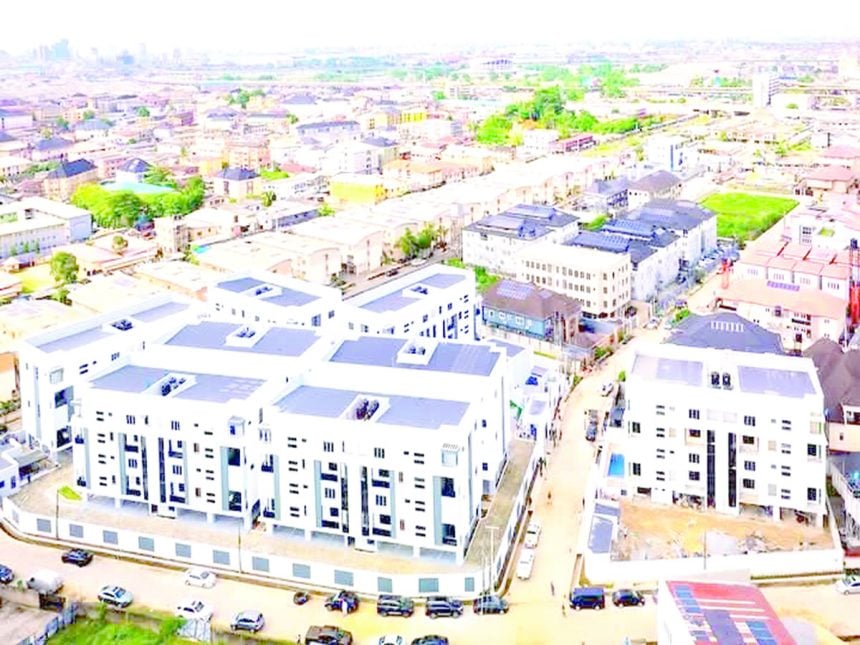Apparently worried by the worsening housing crisis in Nigeria, industry experts, policy makers, and other stakeholders have suggested possible solutions to make affordable houses available to 22 million Nigerians in dire need of accommodation.
Worried that more than 90 per cent of Nigerians cannot afford to purchase a home due to the high cost, the experts pushed for local production of building materials, decentralisation of infrastructure management, and improved access to cheap funds.
They also canvassed collaboration among stakeholders, urgent land reforms, and prioritisation of affordable housing as a pillar of economic growth.
ALSO READ: Experts proffer solution to Nigeria’s energy conundrum
The experts, while expressing grave concern over the deepening housing affordability crisis in Nigeria at the 19th African International Housing Conference in Abuja, argued that inadequate housing not only perpetuates socio-economic inequality but also directly activates civil unrest, influences migration patterns, exacerbates high unemployment rates, rising crime rates, and increased poverty.
They pointed out that the provision of decent housing for Nigerians remains a critical solution to insecurity in the country.
The theme of the forum is: “Re-imagining Housing Through Innovation, Collaboration, and Policy.”
Speaking, former Federal Minister of Information, Professor Jerry Gana, advocated the local production of building materials to reduce the high costs of housing construction.
He also canvassed the decentralisation of infrastructure management by empowering the federation units to provide basic needs like housing.
“We are facing an escalating crisis of high prices for houses and prohibitive interest rates, which are making housing increasingly unaffordable for the average Nigerian worker.
“This represents a significant barrier to home ownership, and remains a major contributor to our nation’s staggering housing deficit, currently estimated to be between 17 and 22 million units. Thus, more than 90 per cent of Nigerians cannot afford to purchase a home.
“The root causes are obvious. Inflation, currently at 23.71 percent as of April 2025, drives up construction costs, while the Central Bank of Nigeria’s high interest rate of 27.5 per cent means that typical mortgage rates often exceed 20 percent, making housing finance largely inaccessible.
“The compound devaluation of the naira only exacerbates these issues, greatly raising the cost of imported building materials,” he said, seeking urgent need to reduce reliance on imported building materials, which constitute 50–70% per cent of housing costs.
“We must come together and produce ‘Made in Nigeria’ houses. Indeed, promoting the widespread adoption of local content in housing delivery is a strategic imperative for sustainable national development,” he added.
Former Head of State, General Yakubu Gowon, who was represented by Professor Suleiman Bogoro, underscored the need to prioritise affordable housing, sustainable urban planning, and inclusive development.
“We must work collaboratively to ensure that our housing policies are not only effective but also equitable and beneficial to all segments of society. The future of Africa’s housing sector depends on our collective ability to innovate, invest, and implement solutions that meet the needs of our growing populations.”
National Programme Officer for United Nations Human Settlements Programme (UN-HABITAT), Paul Okunlola, said that African continent is in desperate need of effective and enduring housing solutions that can adequately curtail the widening gap between the rapidly rising populations in need of decent but affordable housing.
He said that an estimated 2.8 billion globally (about one-third of the World’s population) do not have access to safe, affordable, and adequate housing, thereby limiting their enjoyment of basic rights, including the right to work, health, social security, education, and many others.
He listed conflict and climate-induced displacement, the commodification of housing, fragmented policies, and uneven/inconsistent approach to implementation of strategies as factors driving housing gap in Nigeria.
He underscored the need to rethink urban policies, land use, legislation, and financing to prioritise housing and basic services as key drivers of climate action and sustainable development.
Minister of Housing and Urban Development, Arc. Ahmed Dangiwa outlined the Federal Government’s Renewed Hope Housing Agenda, which he described as a three-tier initiative designed to provide large-scale urban housing, mid-density estates, and deeply affordable social housing across the country.
He said the government is ready to change the narrative of housing in Nigeria through the Renewed Hope Cities, Estates, and Social Housing programmes.
“We will deliver affordable homes and unlock access to long-term mortgages through the new MOFI Real Estate Investment Fund,” Dangiwa said.
Chairman of the AIHS Advisory Board, Surv. Suleiman Hassan Zarma called for legislative reforms, stronger partnerships, and relationship-building among stakeholders to address the housing crisis and unlock new opportunities.
Managing Director, Federal Mortgage Bank of Nigeria (FMBN), Shehu Usman Osidi, announced new financing products, including a Non-Interest Mortgage Loan, Diaspora NHF Mortgage Loan, Rent Assistance Product, and Rent-to-Own Scheme, which he said would bridge the affordability gap and cater to diverse income levels and ethical banking preferences.
Chairman of the Presidential Fiscal Policy & Tax Reforms Committee, Taiwo Oyedele, spoke on tax reforms needed to unlock housing sector growth.
“The housing sector is the new gold,” he said, announcing incentives such as VAT and stamp duty exemptions on rent, tax holidays for building material manufacturers, and reduced withholding tax on construction.
He called for urgent land reforms, describing Nigeria’s land titling process as “a nightmare full of fraud, bureaucracy and delays,” and urged simplification and transparency to attract investment.
International experts from Egypt, Rwanda, and Hong Kong shared best practices on public-private partnerships, affordable housing delivery, and climate-resilient construction.
WATCH TOP VIDEOS FROM NIGERIAN TRIBUNE TV
- Let’s Talk About SELF-AWARENESS
- Is Your Confidence Mistaken for Pride? Let’s talk about it
- Is Etiquette About Perfection…Or Just Not Being Rude?
- Top Psychologist Reveal 3 Signs You’re Struggling With Imposter Syndrome
- Do You Pick Up Work-Related Calls at Midnight or Never? Let’s Talk About Boundaries







